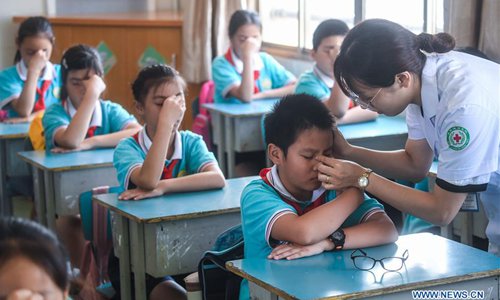HOME >> CHINA
Experts warn of tough battle against visual impairment
By Wang Qi Source:Global Times Published: 2019/7/3 20:08:40

A teacher teaches a student to do eye exercises in Donglin primary school in Donglin Township of Huzhou City, east China's Zhejiang Province, September 4, 2018. Classes are being taken to popularize the knowledge of protecting eyes as China aims at curbing the rise in nearsightedness-or myopia-among children and teenagers. Photo: Xinhua
Four years after a report into China's national visual health, the topic has once again become a hot topic on the internet as the report's author recently expressed concerns that the problem of myopia among children and adolescents has not changed much.As China's first domestic white paper on vision health, the 2015 report noted that about 450 million people in China over 5 years old had problems with myopia in 2012, and the number was very likely to increase to 700 million by 2020 if no effective measures were taken.
Li Ling, the chief editor of the report and a professor with the China Center for Health Development at Peking University, recently warned that the problem of myopia is still very severe despite various measures taken in recent years.
In 2018, China's Ministry of Education, the National Health Commission and six other departments jointly started a project to cut the myopia rate among 6-year-old kids to 3 percent by 2030, according to the Xinhua News Agency.
The number of China's myopia patients in 2018 reached about 600 million, 40 percent of whom were primary school students, Xinhua said.
Li estimated that by 2020, China's rate of myopia will reach 77.42 percent among those aged 5-15 and 94 percent for those aged 16-24.
The rise in visual health problems could have a negative impact on China's development and security, and Li has called for a national office for comprehensive prevention and control of myopia to be set up.
Doctors called for parents and children to develop healthy habits to protect their eyes.
"Students and kids should moderate the use of their eyes in a close range to avoid eyes fatigue, and change bad habits while reading," an expert surnamed Niu from Tongji Hospital in Central China's Hubei Province, told the Global Times on Wednesday.
Niu suggested students should have one or two hours of outdoor activities during the day instead of playing video games. She also noted the importance of regular eye tests to curb eye disease at early stages.
Posted in: SOCIETY,CHINA WATCH